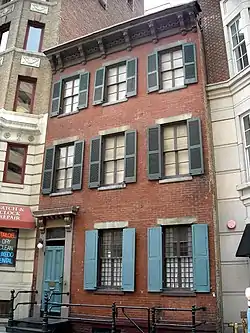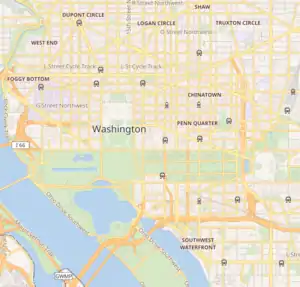Alibi Club
The Alibi Club is a traditional private club in Washington, D.C. Its members consist of the Washington elite, including presidents, senators,[2] and diplomats,[1] among other prominent figures.
Alibi Club | |
 Alibi Club in 2008 | |
   | |
| Location | 1806 I Street, NW Washington, D.C.[1] |
|---|---|
| Coordinates | 38°54′4.2″N 77°2′31.4″W |
| Built | 1869 |
| Architectural style | Italianate |
| NRHP reference No. | 94001221 |
| Significant dates | |
| Added to NRHP | October 21, 1994[1] |
| Designated DCIHS | June 17, 1992 |
History
In 1884, seven Washingtonians founded the Alibi Club, a private social club of prominent political and social figures. Its name derived from the club practice of providing an alibi when the member's family questioned the whereabouts of a member. The club's founding purpose was to foster "mutual improvement, education, and enlightenment" among members of Washington society. Membership also extended to out-of-town figures from New York City, Boston, and Philadelphia, most likely to share information between communities and help in the development of strategies to address civic issues. Throughout its history, it has hosted numerous world leaders, including King Leopold of Belgium, Prince Albert of Belgium, Prince Henry of Prussia, and Viceroy Li Hongzhang.[1]
Clubhouse
The first clubhouse was situated at 17th and Pennsylvania Avenue, NW. Since 1886, the club has occupied a three-story, brick townhouse blocks away from the White House. The clubhouse is furnished with donated memorabilia and artifacts covering nearly every available wall section on the first two floors. The clubhouse is also notable as a well-preserved example of residential architecture in a commercial district and was added to the National Register of Historic Places on October 21, 1994.[1] In 2018, the building was listed as a vacant property.[3]
Membership
Membership is limited to fifty, with new members admitted upon unanimous vote after the death of a previous member. Membership is not revealed to outsiders, and the first public notice of membership is often in a member's obituary.[2]
Some of the Alibi Club's most prominent members have included: President George H. W. Bush,[4] his father, Senator Prescott Bush, Supreme Court Justices Potter Stewart and Stanley F. Reed, Allen Dulles and John Foster Dulles, Speaker of the House Nicholas Longworth, and General George C. Marshall.[1]
- David M. Abshire[5]
- David Acheson[6]
- Dean Acheson
- Theodore Achilles
- Lamar Alexander[7]
- Chandler Anderson[1]
- Larz Anderson[1]
- Warren R. Austin[8]
- Truxtun Beale[1]
- Gist Blair[1]
- Robert Woods Bliss[1]
- Frederick N. Brooke[1]
- David K.E. Bruce[1]
- George H. W. Bush[4]
- Prescott Bush[1]
- George E. Corcoran[1]
- Thomas Gardiner Corcoran[1]
- Dwight F. Davis[1]
- Allen Dulles[1][2]
- John Foster Dulles[1]
- James Dunn[1]
- Walter Edge[1]
- George A. Garrett[1]
- Charles C. Glover III[1]
- Gordon Gray[1]
- Cary Grayson
- Joseph Grew[1]
- Alfred Gruenther[1]
- Frederick Hale[1]
- George Hamilton, Jr.[1]
- Nelson Hartson[1]
- Christian Herter[1]
- William Hibbs[1]
- Archibald Hopkins[1]
- Walter Bruce Howe[1]
- David B. Karrick[1][9]
- Samuel Kaufman[1]
- John Kean[1]
- Emory S. Land
- Nicholas Longworth[1]
- Robert A. Lovett[1]
- George C. Marshall[1]
- Clarence Moore[10]
- Benjamin Mosby McKelway[1]
- John Lord O'Brian[1]
- Thomas Nelson Page[1]
- Stanley F. Reed[1]
- Henry Roosevelt[1]
- Jules Henri de Sibour[1]
- Potter Stewart[1]
- James W. Symington
- Maxwell Taylor[1]
- J.W. Wadsworth[1]
- John F. Wilkins[1]
- Clarence R. Wilson[1]
- Blanton Winship[1]
- Jerauld Wright[1]
- William M. Wright[1]
- John Adams Bross[1]
- C. Boyden Gray[1]
See also
References
- "NATIONAL REGISTER OF HISTORIC PLACES REGISTRATION FORM". United States Department of the Interior, National Park Service. 1994. Retrieved July 28, 2011.
- Kelly, John (May 10, 2009). "My Alibi? They Wouldn't Answer Answer Man". The Washington Post. Retrieved May 12, 2009.
- Delgadillo, Natalie (June 13, 2018). "Did This Old Timey Washington Gentleman's Club Go Extinct?". DCist. Archived from the original on 2018-06-14. Retrieved June 14, 2018.
- "Bush Belongs to 3 Men's Clubs". The New York Times. February 1, 1989. Retrieved May 12, 2009.
- "ConocoPhillips White House Lecture Series - 10/26/2005: David M. Abshire". George Bush Presidential Library Foundation. Retrieved July 28, 2011.
- "DAVID C. ACHESON, ESQUIRE: Oral History Project" (PDF). Historical Society of the District of Columbia Circuit. 2010. Retrieved December 21, 2011. Pg. 35
- Raju, Manu (November 7, 2011). "On the menu: Bipartisanship". Politico. Retrieved December 21, 2011.
- "Inventory of the Warren R. Austin Collection, 1877-1962". University of Vermont. Archived from the original on July 15, 2014. Retrieved January 4, 2012.
- "David Karrick, 67, Ambassador, Dies". The New York Times. 1960-08-07. p. 85. Retrieved 2022-02-16.
- "President's Aide Among Passengers on Crippled Ship". Washington Times. April 16, 2012. Retrieved February 20, 2019 – via Encyclopedia Titanica.
External links
 Media related to Alibi Club at Wikimedia Commons
Media related to Alibi Club at Wikimedia Commons